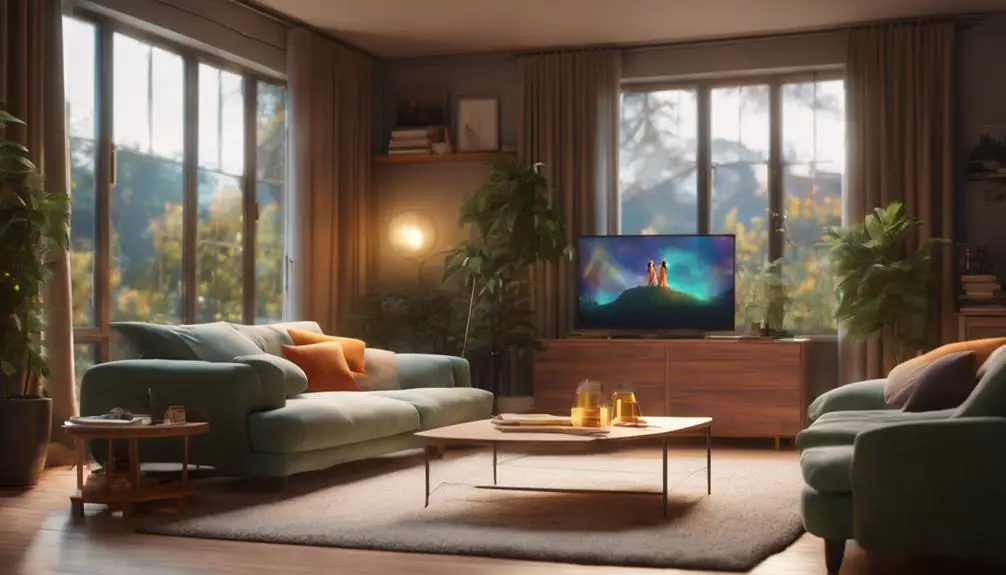You can wear reading glasses to watch TV, but it’s not the best idea. These glasses are designed for close-up tasks, so they may cause strain and discomfort when focusing on the screen. Since they distort clarity for distant objects, your viewing experience might suffer as a result. This can lead to headaches and eye fatigue over time. If you’re frequently watching TV, consider alternatives like progressive lenses or computer glasses, which cater to multiple distances. Stay tuned to find out how different options can enhance your overall viewing comfort and enjoyment!
Understanding Reading Glasses
Reading glasses are designed to enhance your close-up vision, making it easier to see small text and details up close. If you’ve ever found yourself squinting at your phone or struggling to read a book, you know how frustrating that can be. These glasses help you reclaim that freedom to enjoy your hobbies without straining your eyes. They’re specifically calibrated for near vision, so you won’t need to worry about the discomfort that comes from not seeing clearly. Whether you’re reading, knitting, or working on a DIY project, the right pair can make all the difference. Just remember, they’re not meant for distance viewing, so save them for those moments when you want to immerse yourself in the details.
How Vision Works
Understanding how vision works can help you appreciate why reading glasses are beneficial for close-up tasks while not ideal for watching TV or viewing distant objects. Your eyes focus light through the lens, allowing you to see clearly. When you wear reading glasses, the prescription helps your eyes focus better on nearby text or details. However, they can distort the clarity of objects further away, like your TV screen. This is because those glasses are designed specifically for short distances. Your eyes naturally adjust to different distances, but if you’re wearing the wrong glasses, it can lead to strain. So, while reading glasses are great for reading, they won’t give you the freedom to enjoy your favorite shows in sharp detail.
Distance Vs. Near Vision
How do distance and near vision differ, and why does it matter when choosing the right glasses? Distance vision allows you to see faraway objects clearly, while near vision focuses on close-up tasks like reading or using your phone. If you’re spending hours in front of a screen, understanding these distinctions is essential. Wearing the wrong glasses can lead to discomfort, headaches, or blurred vision. Reading glasses are tailored for close distances, making them unsuitable for watching TV, which requires distance vision. If you want to enjoy your favorite shows without straining your eyes, you’ll need specific glasses designed for that purpose. It’s all about freedom—freedom from discomfort and the ability to see clearly, no matter the distance.
Benefits of Wearing Reading Glasses
Using reading glasses can greatly enhance your ability to focus on close-up tasks like reading, crafting, or working on a computer. By using them, you’ll enjoy several benefits that promote your freedom to engage in activities without straining your eyes:
- Improved Clarity: Enjoy sharper images and text, making your favorite hobbies more enjoyable.
- Reduced Eye Strain: Less fatigue means you can focus longer without discomfort.
- Better Posture: You’ll be less likely to hunch over as you try to see better.
- Increased Productivity: With clearer vision, you can complete tasks efficiently.
Embrace the freedom to see clearly and enjoy life fully!
Potential Drawbacks
While reading glasses offer numerous benefits for close-up tasks, there are potential drawbacks to bear in mind when wearing them for activities like watching TV. First, reading glasses are designed for close distances, so they might not provide the clarity you need for watching a screen that’s farther away. This can lead to eye strain or discomfort during longer viewing sessions. Additionally, if your prescription isn’t meant for distance vision, you could miss out on the full visual experience of your favorite shows. You might also find yourself constantly adjusting your glasses, which can be distracting. It’s crucial to reflect on how these factors affect your comfort and enjoyment, so you can freely indulge in your viewing habits without compromise.
Alternatives to Reading Glasses
If reading glasses aren’t cutting it for watching TV, there are several alternatives you can consider to enhance your viewing experience. You don’t have to be stuck with discomfort or frustration. Here are some options to explore:
- Progressive lenses: These can help with multiple distances, including TV viewing.
- Computer glasses: Designed for screen use, they reduce eye strain from digital devices.
- Blue light blocking glasses: They protect your eyes from harmful blue light emitted by screens.
- Adjustable magnifiers: These can be used for close-up viewing when needed.
Explore these choices and find what works best for you!

